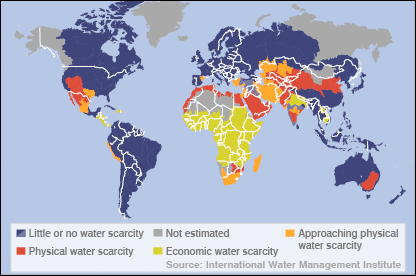
A new paper from researchers at McGill and Utrecht universities suggests that, despite frightening increases in water scarcity worldwide, the situation is not yet irreversible. The paper, Wedge Approach to Water Stress, outlines six strategies that researchers believe can be combined in a number of ways to reduce water stress in different parts of the world.
The strategy areas range from “hard path” measures, like building more reservoirs and increasing desalination efforts, to “soft path” measures such as improving agricultural water productivity and irrigation efficiency, improving domestic and industrial water use, and limiting the rate of population growth.
“There is no single silver bullet to deal with the problem around the world,” said Tom Gleeson, one of the paper’s authors, in a McGill release. “But, by looking at the problem on a global scale, we have calculated that, if four of these strategies are applied at the same time, we could actually stabilize the number of people in the world who are facing water stress rather than continue to allow their numbers to grow, which is what will happen if we continue with business as usual.”









